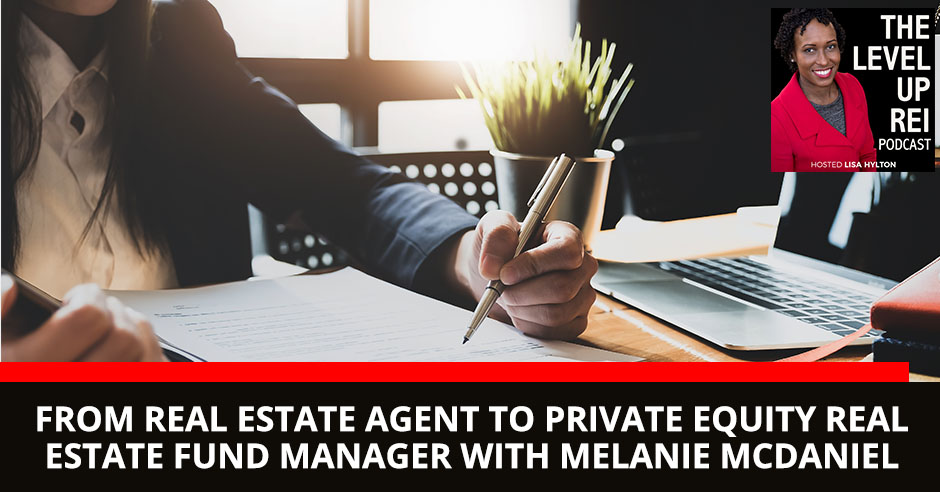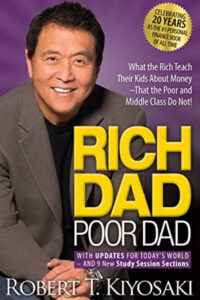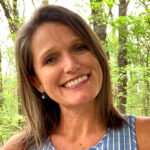
After reading the book Rich Dad Poor Dad, Melanie McDaniel realized that building wealth requires knowledge. She is just trading her time with money through her job, which needs to change. She decided that real estate investing was the way to go, even if she was unsure how to start. She underwent some training programs, studied, and built her way up into being a private equity real estate fund manager. Join us in her journey and equip yourself with real estate strategies to help you climb that ladder to success!
—
Watch the episode here
Listen to the podcast here
From Real Estate Agent to Private Equity Real Estate Fund Manager With Melanie McDaniel
We’re back with another amazing guest, Melanie McDaniel. She is the Founder of Freestyle Capital Group, a boutique private equity firm and Freestyle Fund, a customizable fund. She partners with passive investors to invest in private equity and real estate transactions across a variety of asset classes, operators, geographies and investment strategies. Melanie offers a Michelin Star experience with curated investment opportunities and aims to have a personal relationship with each investor. I’m super excited to have you on the show. Welcome to the show, Melanie.
Thank you. I’m so happy to be here.
I’m happy to have you. Let’s get started on your story. Can you share with my readers a little bit about how you got started in wrestling in real estate?
I am a late bloomer. I did not even think about real estate or know how amazing it was until 2015 when I read Rich Dad Poor Dad like a lot of people. That book has changed a lot of lives, I’m sure. At the time, I was a government employee. I worked for the federal government as a park ranger in law. I was on that path of life because I had been in the military. It was a nice and easy transition doing a job that I didn’t realize how much I was not fulfilled. I am an entrepreneur at heart but I didn’t know it at the time.
I read that book and realized that I was trading my time for money with the job. I had a certain level that I was going to get to and I was never going to be a multimillionaire. As a park ranger, I was never going to be anything more than whatever that ceiling was for me in my GS pay grade. I realized I was trading my time for money and that real estate was a place where I could venture to build wealth.
Instead of trading my time for money, my money goes out and makes money for me. I liked the idea of that. It took me about two years, from 2015 to 2017, to transition myself out of a job but it was more of a mental block that I had because I was raised by employees, save, go to school, get a good job, do the college thing, save my money and live within my means. That was the path I was on.
Be an entrepreneur at heart. Share on XI decided that real estate investing was where I wanted to go. I wanted to go big but I had no idea how to get there. I didn’t even know what big meant. Was it apartments or industrial? I just knew that I didn’t want to do single-family necessarily. I wanted to go big. I did one of the Rich Dad Poor Dad guru training programs. I learned a ton and thought, “I’m not ready to go flip or buy. I’m going to become an agent and learn on the job. I’ll watch everybody else do what they do.” My stepping stone was being a real estate agent.
I did that for two and a half years. I worked with investors. I had a meetup and built a huge network. I’ve got 500 or 600 people on my list. I created a team, which was one great thing. The Rich Dad Poor Dad method is a self-employed employee and a real estate agent is self-employed. If you create a business and you have a team, then when my team goes and makes money, I make money too. That’s the business owner. The last box is that investor, where your money is making your money. I went from employee to self-employed as an agent and then when I started the team, I became the business owner. I started seeing how things could be different from trading your time for money versus owning a business or investing.
As a real estate agent, I was exposed to Michael Blank. I ended up doing his program. He’s another guru in a training program that teaches you how to buy apartments. I decided I was going to skip over the single-family stuff in general and head straight to apartments. There’s not a big difference. There are more doors and zeros but for the most part, the fundamentals are the same.
I ended up buying a 24-unit. In the whole process of it, I realized I didn’t love it that much but I still believed in it. What I did love about it was the capital piece. Finding great investments with great returns and providing that opportunity to people is where I saw myself fitting the most. Instead of being the person that’s going and looking for deals, underwriting deals, walking properties and all of that stuff, I decided I was going to find the best players that love to do that and are good at that.
I’ll find investors who want to stay in their job. They’re happy doing it, connect the two and then figure out how to fit me into the middle. At the end of the day, I’m an investor. I don’t want to just do transactional stuff. I want to build equity. That’s what led me to the fund, where instead of having an asset management fee or making money to getting my license to be a broker-dealer, I want to start the fund because I want to own equity in all of the real estate I do and be an investor alongside my investors.
You talked about being a park ranger and then eventually reading the Robert Kiyosaki book, realizing the mental block that you had to get over. A part of what helped you transition was being a real estate agent and then building the team and the real estate agent. Some readers are probably real estate agents themselves. I know a few of them. They’re like, “I want to invest in real estate,” but they haven’t taken that leap yet for whatever reason. Can you talk a little bit about building that team? That was critical in helping you to leverage other people as well, in terms of moving to that next step? Is that accurate or not so?

Real Estate: When you start a team and become a business owner, you start seeing how things could be different from trading your time for money versus owning a business or investing.
It is a huge part of it because if you are the broker, you are the team leader. You split with your team members. You need to provide them value. How you provide a real estate agent value is to give them leads. If I can generate leads, then I can grow a team. If you can’t generate leads, then why are they on your team? That’s the value that you have to bring.
I had this huge meetup and all these investors to serve. I couldn’t help everybody. I had to have a team. I didn’t have a choice. I needed to turn people away or refer them to someone, not in my network. I made a lot of friends and helped a lot of people get their licenses and first deals because I brought them onto my team and fed them leads so they got to go there. I got to train them on how I wanted them to be as far as investor agents. That’s what I specialized in.
Can you talk about the decision to create a meetup?
Part of my journey besides Rich Dad Poor Dad was BiggerPockets. I listened to it for a lot of hours on patrol, getting paid to drive around. I would take my phone hiking with me when I do a patrol. I was a park ranger so I’m walking around on the trails. I’m listening to BiggerPockets for hundreds, if not a thousand hours. They provided on there an event listing. A lot of the people that they interviewed talked about it. The key with the meetup, I don’t know if they are common that they would have the same oomph that mine did because I was a pioneer in that meetup space.
If you are at the front of the room, whether you’re the one teaching or not, you are the name. Like you on this show, you automatically have a certain prestige or are in the position of someone who knows stuff. Whether you do or don’t, you are at the front of the room. That helps me. When I moved from California to Virginia and started the meetup, I arrived in Virginia on a Wednesday. My first meetup was Saturday. I knew that was going to be part of my business model because I needed to provide value to people so they would come and work with me.
Some of them would figure that out but it was from an accumulation of listening to podcasts, knowledge and the idea that you have to give to receive. I brought in people to speak like contractors, lenders, 1031 exchange custodians and whoever could bring value to my investors and those resources. I shouldn’t have to speak. I just had to put it all together.
Being a real estate agent could be a stepping stone. Share on XMany of those people are still around. They have formed partnerships from coming to that meetup and all those powerful things. I feel like it translates to a little bit of the value of your business like the Freestyle, going out there, building relationships and going to the different conferences because these days you do travel a lot extensively in terms of being out there and meeting. Can you talk about how you’ve evolved from hosting meetups to getting out there and being in these different conferences, meeting people and the power and benefits that has provided for you?
We are in a people business and real estate is the vehicle. It’s sales, honestly. At the end of the day, if you can sell, you can make a ton of money. What I do is sales. I believe in a product that’s easy to sell and I don’t feel like I’m selling it. This is just, “If you want to be wealthy, invest in real estate.” I don’t have to sell that. It sells itself but it is safe. When you are in a people business, you have to form real relationships with real people. There are some people that make a great living, can raise a lot of capital and do a lot of deals because they have a huge platform and thousands of people through their funnel and hundreds will invest.
That’s not how I want to build my business. I want to know real people. That’s why when you read my bio, it is, “I want to have a personal relationship with all my investors.” I’m here to do life. This is life. Like talking to you, “Am I working or is this how I roll? Is this meetup I’m going to?” The reason I’m going to a meetup in Austin is I want a drink. I got a hotel room so I don’t have to drive home.
I’m meeting with a bunch of commercial real estate investors. Is that work or life? I want to do life. I believe in what I’m doing. I have a ton of fun. It’s interesting to me that being a park ranger, I would clock in or radio in. I would get paid for the hours, then radio out and never see the people that I work with. They weren’t my buddies. We didn’t have anything in common except when we were at work. It’s a lifestyle to me.
I touched on a little bit that you have a customizable fund that you’ve called Freestyle Fund. Can you talk about the thesis for that fund? Where and what you are seeking to provide?
At the start, it was to provide people opportunities to invest in real estate as passive investors in the Main Street private offerings. Not too long ago, it was a good old boys club. You had to know someone to get in. These guys are making tons of money, saving tons of money on taxes and becoming wealthy while the rest of America is throwing their money in the stock market and doing what we’re told in school. It was not taught in school at all. As the syndication world and private offerings have got a bit more public, I had this desire to bring this to people so they had options outside of Wall Street to invest. It started out as I want to provide the deal but in finding my deal, I’m like, “That’s not very fun. I don’t like that very much.”

Real Estate: Finding great investments with great returns and providing that opportunity to people is a fulfilment for real estate investors.
It moved to deal by deal, where I’ll either co-GP or partner with someone who has the deal and bring the capital to me by doing an SPV, which is a Single Purpose Vehicle. A fund is created for the purpose of investing in one identified deal and then it’s done and closed. It’s about $10,000 to $15,000 in costs to get the fund up and running. It dilutes investor returns, which at my heart is not to dilute investor returns. I want investors to get as much as they can but there is a cost to doing business. I can’t work for free. I do have to have food for my dinner. I have to get paid in there and cost the fund.
It dilutes investor returns. I came across a company that offers a software platform where it’s almost like a bunch of SPVs on one fund. It’s one legal document. I pay that $10,000 one time for the whole life of the fund versus every time I do a deal. When I do a deal, it’s customizable, meaning the fund is the security. It has its PPM, operating agreement and subscription agreement. Once the money is in the fund, the investor can go in and pick which stock we’ll call it and which investment they want. It’s like a brokerage account for stock. You go in and put your retirement money.
You’ve got mutual funds and ETFs. Someone else has gone and created a portfolio for you that’s balanced across industries, geographies and domestic versus foreign. Someone else has put that together. We call it S&P 500 or the Dow or you can go in and buy your stocks. You can be like, “I want some Apple, Tesla or Shopify. Give me some of that Bitcoin or Grayscale.” You create your portfolio.
What I’ve created is instead of a REIT or a Blind Fund where you invest and someone else picks your stocks, I have created a platform in the software that the company they’ve created is where they can invest in the fund and then only buy the shares or slices of the deals they want. Do they want multifamily, triple net, storage or mobile home parks? Are they like, “I don’t want to do assisted living but I do like this RV storage place?” They can go in and create their little Robinhood account.
Essentially, obtained diversification and then got exposure to different real estate projects. It’s not like you’re picking for them. They get to ultimately choose their path, which is awesome.
For a passive investor, the key is knowing as many sponsors as you can so you can pick who you like the best. When that sponsor has a deal, you can invest. That takes a lot of time, energy, underwriting and vetting of each of these people. If you have the time and you can go get to know ten sponsors, it’s great. If you have time and you meet one company you like, invest with them every single time and then they are on the same market, asset class and operator, you’re not diversified at all. You’ve got all your eggs in that one basket. What I do is I spend a ton of time traveling and going to conferences. I went to 9 in 2021 and had been to 3 in 2022. I meet people and sponsors.
When you’re an investor, you want to build equity. Share on XI get a foot in the door and then they send me their deal like, “I decide I like you. You have a good reputation.” I then decide, “I like you but I don’t like your deal. Nevermind.” Hopefully, the funds are relatively new. Building the diversification takes time. Over time, investors will have an opportunity to invest and take shares of a couple of different either sponsors, geographies or asset classes. By investment strategy, I’m talking, “Are they cashflow deals or upside deals? Are they by development where you don’t get paid for five years or are they assisted living where you get paid the minute you close and start collecting the check?” Diversify all of those things.
One of the things that come to me is passive investors who are reading are like, “One of the questions I hear a lot is doing due diligence and sponsors.” I see that the heavy part of fund managers’ job is doing due diligence on operators, deals and markets. Can you talk about the advice you would give to passive investors as they think about deploying capital and working with doing due diligence?
When it comes to due diligence, you don’t know what you don’t know. For someone who is getting started, it’s hard to say, “You should be doing background checks on your sponsors.” You should be calling their passive investors and asking how to engage with their investors. Who’s their CPA and lawyer? Interviewing, talking and knowing their reputation in the business would be like, 1) I don’t even know if passive investors know to do all those things or, 2) How do you have the time to do all of that for every deal you want to do?
There is VeraVest.com. They have a program where sponsors can pay VeraVest to verify them and then they get this verified and marked if all of their financials are clean. I’m not saying it makes them a great sponsor but they have gone through some litmus tests from a third party. There are a bunch of operators on that website.
There’s 506 Club, a nonprofit that gets together and talks to each other about their experience with different sponsors. That’s one resource that might have some. There are some great operators who are doing a great job that isn’t on all these websites. You are going to miss some. That would be the first place to go to see if you are working with a legit company.
You can do a bunch of Google research, FINRA and SEC search for any bad boy clauses or people who have got in trouble before. That’s public information if an operator isn’t supposed to be doing securities. I do a background check at Checkr. The public can’t go and do a background check on anybody they want. It’s not through Checkr. Maybe you can do it somewhere else but at least they run any financials and times they’ve filed bankruptcy. I even got driving records from some of my sponsors. It’s like, “You are maybe clean but you run a lot of stop signs.” There’s a lot of information out there you can get on people but you can’t always just do it whenever you want. It costs money.

Real Estate: When you’re in a people business, you have to form real relationships with real people.
If you, as an individual, are betting a bunch of sponsors, it’s going to add up pretty quickly. If you don’t know how to underwrite, you have to hire that out potentially to a third party, which is fine. There’s a company called BullpenRe.com. I can’t refer them anymore because they have a minimum of $6,000 before they work with anybody. They grew so much. It’s more of an operator or sponsor would use them. I don’t know of any other companies that can do underwriting on your behalf but unless you want to go learn how to underwrite, you can do that too. You don’t know what you don’t know.
Even underwriters, if they’re new to the business, they could have gone to school or say they are a great underwriter but you don’t know what you don’t know if you haven’t been in the business for a while because there’s new stuff to learn all the time. To do their due diligence, at a minimum, the most important thing is the human. If you get the jockey right, you should have a good market, asset and underwriting.
That’s number one. If you have time to do one thing, it’s spreading the sponsor but there are a lot of other things that need to be looked into as well. I don’t know of any third-party companies that do all of that for you but like VeraVest, it will tell you if the company has a good reputation and standing at the moment they did it but who knows after that? Who knows what’s happening with the current projects? It’s only as good as the date they got verified.
It is a journey. I tell people all the time, “Every time you invest, you’re taking a risk.” I remember going to a best-ever in 2020 and Julian Homan had said the very next day after the property was closed, all the performers were wrong. You are taking estimates and it’s your best estimate. You want to be working with people like a team that has experience and wherewithal financially to weather storms and go from there. That’s also very critical.
Can you talk about investing in the market? We have rising inflation and increased rates as the fed seeks to get a handle on the economy. You have investors that are feeling a little bit cold feet at times when it comes to investing in real estate. The expectations need to be adjusted a bit. Can you talk about what you’re seeing and how you are navigating the seas ahead?
It’s a scary time. If you’re not scared, good luck to you. You need to be looking at this stuff. Return expectations need to be adjusted. In the last years, anybody that’s done real estate has been a genius. We’ve been saying, “Projections at 15 and they’re getting 35 IRS.” People are doubling returns in two years. It’s been insane. It’s luck, not skill. When you are looking at your sponsors, what were they doing in 2008 and 2009? If they weren’t in real estate, it’s not a deal killer. Where is their head on that? A lot of people lost their shirts in those years. What are they doing? How did they overcome it? What have they been through as far as market cycles go? I always like to ask that.
If you are the broker, you are the team leader. Share on XThe debt piece is huge because I’m seeing a lot of these bridge debts and ARMs, which are Adjustable-Rate Mortgages. You need to know what to be asking. If they do have an ARM, do they buy a cap or refi in year three? Is it long-term? There’s a lot of these 3-1-1, where it’s 3 years and then a 1-year extension and another. You’re forced to sell a refi.
What if interest rates are higher? What if cap rates decompress, meaning prices come down? All of these one-offs are important and are all driven by that debt piece. The long-term debt, the lowest interest possible is probably not moving forward, not what we have at the moment but securing long-term debt means your payment doesn’t change but your rent increases. Maybe not the value of the property is increasing as money is decreasing. It’s staying the same value but at least your money is a hedge against inflation and maybe even making more.
The debt piece is important to watch moving forward. If you do get long-term debt, what if interest rates come back down and then you have a prepayment that’s huge? I would like to know what the prepayment penalty is. If I get locked into the 6.5% interest rate, which is a reality not too far down the road and in 2 years, it goes back down to3.5% and you want to refi it, you could have a huge prepayment penalty. It’s the debt piece and knowing what to ask, what you’re looking at, what they tell you in their presentation and what’s underwritten is different.
Get a hold of the actual debt terms and look at it yourself or have someone that knows what they’re doing and look at it on your behalf. The third-party from the operator is a good idea and then asset classes. Multifamily is still fundamental to human life. It’s not going to go out of style to have a roof over your head. Multifamily is strong but cap rates are compressing. Interest rates are going up. There are not a lot of yields. Institutional money is chasing this stuff. Alongside us are indicators and the private equity partners who we used to run the show. These institutions are coming in and they’re compressing the prices.
If you want yield and returns, maybe do some multifamily but don’t put all your eggs in that basket. Look at something else that cashflows more. I like triple net industrial because there’s not enough of it in the world, especially in core markets or outside of core markets. As we become a digital age, you have transportation, distribution, storage and cold storage so there is a need for industrial space and they’re not making it very quick.
Think of the Amazon distribution centers. They have to build all those things out. I liked triple net because there’s no real upside but it cashflows usually from day one. It’s a full play for the most part. In your portfolio, diversify to have cashflow and upside but as they move forward, cashflow is more important. When you have to force appreciate something through a value add strategy, you’ve added an extra layer of risk, construction costs, supply chain, labor and the who knows of whatever but I still do invest in value add.

Real Estate: There are some people that make a really great living and can raise a lot of capital and do a lot of deals because they have a huge platform.
I’m doing a build to rent because the fundamentals are still the housing piece and there are lots of exit strategies and conservative underwriting. When you go create something in development, you’re building something that doesn’t exist. The economics of it are huge. That’s one piece. There are short-term rentals and lots of yields but your operator better knows what they’re doing.
You better have an exit strategy in case we have a recession, nobody travels or regulations change and they shut down your operation. There are multiple exit strategies. There’s yield and assisted living but what’s different between short-term rentals, assisted living and something like an apartment complex is that it’s not just strictly a real estate play. It is an operations play and a business.
You need to know that your operator of a short-term rental and assisted living knows what they’re doing. They can either be super lucrative or complete losses. Very importantly, you pick who the jockey is on those ones. At the end of the day, diversification is a hedge against economic turbulence. If you’re diversified and one asset class goes out, you at least have other asset classes. If Florida falls off into the ocean and all of your investments were there, then at least you have some in Texas. If a sponsor turns out to be Bernie Madoff and you’ve invested all your money with him, you’re not diversified.
There are so many risks. When it’s risky and you don’t know exactly what you’re doing, as Warren Buffett would say, “The diversification is for people who don’t know what they’re doing,” be diversified unless you are going to go and be an expert on a market and anatomy class. Even then, all of these operators love them. I’m glad they do what they do in the markets. They’re like, “I wish I was diversified,” but they are honed in on that 1 product and 1 geography. I’m like, “That’s all right. You do your thing. Keep doing a good job,” but I overheard somebody, “I’m going to go over here with this guy too.”
The argument for a customizable fund is the diversification that it’s providing to investors, which is paramount, especially in the market environment. No one has crystal balls who knows what’s going to be going on. We’re all making the best decisions based on the information that we have on hand.
If you get too scared and you want to put your money in a bank, you are already losing because inflation is at 8.5%. I don’t think that’s a good idea either. You can’t just sit and wait this out unless you know the cost of losing 8.5% not one time every year. It’s scary and turbulent. Things are happening but the fact is there’s inflation. Maybe we go deal with a little bit of risk but for things that make sense, if it does not grow your wealth, at least preserve it. Real estate is a great hedge for that.
You have to educate yourself. You have to spend some time learning. Share on XBefore I pivot onto my level-up questions, here’s a bit of a reflecting question. As you take a step back and think about your journey up until this point, if you could tell someone who is earlier in their journey in terms of building real estate portfolios either on the active side or passively, what would you share with them in terms of advice and building a business in this space?
I wish there was something I could say as a switch that will change everything for everyone but you have to educate yourself. Spend some time learning unless you find someone that’s going to take you under their wing and teach you the ropes. There are people that have those. You either have something like that, pay-to-play or do the hard work and learning. It takes time. Back in 2016 or 2017, I wanted to know everything. I was so frustrated but that was many years ago. I’m happy I know what I know now. I’m super stoked. Sometimes you just have to put in the work.
One thing that helped me a lot when I transitioned from W-2 to entrepreneur is that the mindset piece was huge. The biggest game-changer for me was listening to compilations of motivational speeches on YouTube. It saved my life as I was in the trenches of getting the work done but I couldn’t have done the work without having the education first.
I took 1,000 hours of education, plus I read a ton of books, went to a ton of meetups and invested a lot in my path. I don’t think there’s a shortcut except to get involved. Sometimes you just have to do a deal and learn more than if you wait, you aren’t learning. If somebody has money to invest, there are sponsors out there that if you invest with them, they’ll let you look behind the curtain and mentor you through as well. If you can find someone that will do that for you, that would be good.
We all want to get stuff done a lot faster than they are happening. Many times, time is always revealed in addition to taking action. The time while taking action and recognizing that time is also passing. When you then take a look back, you’re like, “I’ve learned so much about myself and got so much more clarity in terms of the path that I’m on and taking.”
As you confidently talked about the Freestyle Fund, the offerings and value that you’re seeking to bring to investors, a lot of that comes from your walk over those years of being in this business. Going through the ups and downs, taking action consistently, trying different things and realizing, “I like this. I don’t like this.” The reality is no one can decide for you what’s going to be best for you. Only you can. You only will get that from you taking action and realizing what your superpowers and strengths are. That’s also very powerful. To finish up the interview here, all of my episodes have the level-up questions that I asked all my guests. The first one is, what are you grateful for in your life.

Real Estate: Sometimes it takes that one person or one opportunity to change the rest of your life.
I am grateful for all the work I’ve already put in to build the relationships I have because I am on the brink of some cool opportunities. Sometimes it takes that 1 person or 1 opportunity to change the rest of your life. I have a few things in the works that all the time is spent in the trenches and relationships. It’s going to start hitting very soon. I’m super grateful. It’s exciting.
What would you say has attributed to your success and continuous growth?
It’s those compilation videos. Sometimes on the entrepreneurial journey, even with the successes that I’ve had, I still need a kick in the pants and a reminder. You need that little cat looking in the mirror and the lion is staring back at the cat. This experience is humbling. You can feel on top of the world and then one phone call can sink you to the bottom. My continued growth as a human and in the beginning with those motivational speeches, set music that makes you feel a certain way to pump and pick you up off the floor or you can’t do it yourself.
My last question is what do you now know that you wish you knew at the beginning of your journey?
It is a journey to discover who you are. Had I known that I wanted to have a fund, be the capital partner and gain equity by bringing investors to deals, I would have started there. To get to where I am, there were so many pivots, paths and doors to walk through to get here. I wouldn’t be able to do what I do now if I was the person years ago. That might not be the answer you want to know but it’s a journey.
That is an amazing answer because so many people feel that they want to get to the end destination. I continue to tell people that there is no end destination. You’re always on this journey and pivoting. As you learn more, you grow, change and create new things. That’s a part of life experience and entrepreneurship.

Rich Dad Poor Dad: What the Rich Teach Their Kids About Money That the Poor and Middle Class Do Not!
I don’t think I will ever arrive. When you arrive is when you die.
Thank you so much, Melanie. Is there anything that I didn’t ask you that you would like to share?
I will give a tip to people to pay attention to the economy and what’s happening in the economy, especially when it comes to debt and interest rates. For anything in real estate, it’s important to have an extra macro perspective on the economy.
Are there certain places you like to go to get or check for information?
Typically, I get a lot of economic updates at the conferences I go to but for people who don’t go to conferences, there are a few like George Gammon and Peter Schiff who I like. He’s super conservative. The joke is that he’s predicted 12 months of the last 2 crashes. The Real Estate Guys Radio Show, I love them. They do some good economic updates. Typically, any of the big people in the space have economic updates, at least at the beginning of 2022. I checked throughout the year.
It’s not the news. I don’t go Fox or CNN but third-party non-partisan resources. Also, Marcus & Millichap. I always take what they say with a grain of salt because they’re brokers. They do great data research so does NAR, which is the National Association of Realtors. If they want you to buy real estate, take it with a grain of salt. They have an agenda as well. They want to paint a pretty picture so you keep buying real estate but they do some great data.
If the readers want to get in touch with you, where is the best place they can go to get in touch?
I’m all over social media. For the most part, it’s LinkedIn, Facebook and Instagram. It is where I put out a lot of information. FreestyleCapitalGroup.com is my website. My email will be Melanie@FreestyleCapitalGroup.com if they want to reach out.
If you’re looking for customizable fun, you know where to go to get some great deals. Thank you so much for coming to the show. I appreciate it, Melanie.
It’s my pleasure. Thank you so much.
Important Links
- Freestyle Capital Group
- Freestyle Fund
- Rich Dad Poor Dad
- Michael Blank
- BiggerPockets
- VeraVest.com
- 506 Club – Facebook
- Checkr
- BullpenRe.com
- George Gammon
- Peter Schiff
- The Real Estate Guys Radio Show
- Marcus & Millichap
- National Association of Realtors
- LinkedIn – Freestyle Capital Group
- Facebook – Freestyle Capital Group
- Instagram – Freestyle Capital Group
About Melanie McDaniel
 Melanie is the founder of Freestyle Capital Group, a boutique private equity firm, and Freestyle Fund, a customizable Fund. She partners with passive investors to invest in private equity real estate transactions across a variety of asset classes, operators, geographies, and investment strategies. Melanie offers a Michelin Star experience with curated investment opportunities and aims to have a personal relationship with each investor.
Melanie is the founder of Freestyle Capital Group, a boutique private equity firm, and Freestyle Fund, a customizable Fund. She partners with passive investors to invest in private equity real estate transactions across a variety of asset classes, operators, geographies, and investment strategies. Melanie offers a Michelin Star experience with curated investment opportunities and aims to have a personal relationship with each investor.
Melanie’s real estate journey began in 2015 when she read Rich Dad, Poor Dad by Robert Kiyosaki. It completely shifted her mindset about money and wealth. She was a law enforcement park ranger at the time, and it took until 2017 for her to prepare to leave the W-2 government job to jump into real estate full time. She started as a real estate agent and went full-time into real estate syndication in early 2020.
Melanie owns a 24-unit property in Norfolk, Virginia with partners, she is a limited partner on a 276 unit apartment in Huntsville, Alabama, she is a private equity fund manager, a Co-Sponsor in a luxury residential assisted living portfolio in Dallas, TX, and a Co-GP in an industrial net-lease in Longview, TX. She is a Fund Manager of Freestyle Fund, a customizable fund with a variety of asset classes under management.

Recent Comments